|
The Fifth FNCA Coordinators Meeting
March 3-5, 2004, Tokyo, Japan
 The Fifth FNCA Coordinators Meeting (CM) was held from March 3 through 5, 2004 in Tokyo, Japan, hosted by the Cabinet Office (CAO) and the Ministry of Education, Culture, Sports, Science and Technology (MEXT) of Japan. The Fifth FNCA Coordinators Meeting (CM) was held from March 3 through 5, 2004 in Tokyo, Japan, hosted by the Cabinet Office (CAO) and the Ministry of Education, Culture, Sports, Science and Technology (MEXT) of Japan.
The Meeting is followed up the Fourth FNCA Meeting in Okinawa, Japan last December, where the Ministers and Senior Officials iscussed the FNCA policy, object, and important items for management and operation of FNCA activities.
The Coordinators Meeting is functioning as practical forum for discussion of activity reports and coordination of work plan. FNCA Coordinators or their substitutes from 9 FNCA countries, Australia, China, Indonesia, Japan, Korea, Malaysia, the Philippines, Thailand and Viet Nam, and the IAEA representative also participated.
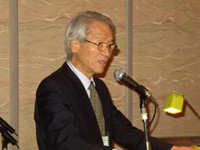 At first, Dr. Sueo Machi, FNCA Coordinator of Japan and Commissioner of Atomic Energy Commission of Japan, in his opening remarks, praised that every activity had progressed with tangible results based on the partnership, the basic spirit of the FNCA's Vision and Goal. At first, Dr. Sueo Machi, FNCA Coordinator of Japan and Commissioner of Atomic Energy Commission of Japan, in his opening remarks, praised that every activity had progressed with tangible results based on the partnership, the basic spirit of the FNCA's Vision and Goal.
The FNCA activities in FY 2003 were reported by Dr. Machi together with the result of the Fourth FNCA Meeting. He introduced significant achievements of on-going projects such as radiation therapy of uterine cervix cancer, development of productive new varieties by mutation breeding, application of research reactors for daily life, dissemination of nuclear safety culture and so on.
As the highlights of this Meeting, two new activity plans were presented:the Panel on "Role of Nuclear Energy for Sustainable Development in Asia" and the project on "Application and Utilization of Positron Emission Tomography (PET), Cyclotron and Radioisotopes in Medicine".
According to the outline and plan of the Panel addressed by Japan, it is to study the long-term energy plan for 20 to 50 years by comparing production cost of energy resources, reduction of greenhouse gas (GHG) emission.
The possibility of introducing nuclear power, and usefulness of non-power application will be also examined.
The first meeting of the Panel was proposed to hold some time between August and October this year in Japan.
The Coordinators Meeting recognized that it was important to have experts from environmental and energy sectors together with nuclear one.
The Coordinators Meeting supported the objective and its work scope at the panel and agreed that the strategic energy plan would be useful for all participating countries regardless of the possibility of nuclear power introduction.
 Another new project on PET and Cyclotron is the first one proposed by the Government of Malaysia other than Japan that has taken initiative on the FNCA and Australia who is in charge of Nuclear Safety Culture. Another new project on PET and Cyclotron is the first one proposed by the Government of Malaysia other than Japan that has taken initiative on the FNCA and Australia who is in charge of Nuclear Safety Culture.
PET and cyclotron are important tools in oncology for early detection of diseases and treatment.
Dr. Mohamed Ali Abdul Khader, Malaysian medical doctor of Penang Hospital, proposed the project's outline.
The Coordinators meeting endorsed his proposal, and the project is scheduled to start in FY 2005 based upon detailed work plan.
It is expected that the project will contribute to share their expertise and information of the technology in the field.
 In the evening of the first day, the Welcome Reception was held on the 42nd floor of the Keio Plaza hotel with beautiful nightscape outside the window. In the evening of the first day, the Welcome Reception was held on the 42nd floor of the Keio Plaza hotel with beautiful nightscape outside the window.
Collaborators and supporters of the FNCA activities joined the party to deepen a friendship with the Coordinators and representatives of FNCA countries.
Prof. Shunsuke Kondo, Chairman of AEC of Japan gave a cordial message and encouraged the FNCA's progress.
Aiming at the further effective implementation, how to evaluate the projects was taken up for the first time during this Meeting.
To the proposal of Japan, the Coordinators Meeting consented to introduce performance indicators for each project.
As for the indicators, it was suggested that they should reflect social impact, progress of human resources development, result of research and development activities, cost-benefit effect and so.
According to consent, the evaluation will be done by each project from the objective viewpoint, and its result will be reported to the next Coordinators Meeting.
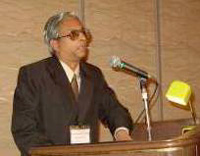 As an invited speaker, Prof. Prinath Dias, RCA Regional Co-ordinator, Africa and East Asia + Pacific, Technical Co-operation Dept. presented an overview of the IAEA/RCA activities. As an invited speaker, Prof. Prinath Dias, RCA Regional Co-ordinator, Africa and East Asia + Pacific, Technical Co-operation Dept. presented an overview of the IAEA/RCA activities.
The Meeting recognized the importance of close linkage and synergy between IAEA/RCA and FNCA activities.
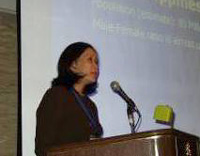 It was the routine job but most important task for the Meeting to discuss and review the FNCA projects in eight fields. It was the routine job but most important task for the Meeting to discuss and review the FNCA projects in eight fields.
They approved the progress of on-going projects and their future plans.
The tentative schedule for Workshops/Meetings and the three-year work plan of each project will be announced on this web site soon.
Lastly, the Representative of Viet Nam announced the Fifth FNCA Meeting for forthcoming November in Ha Noi.
The Meeting is planned under the basic theme of "Nuclear Human Resources Development Cooperation in Asia".
After adopting the Minutes, the Meeting came to end with the closing remarks by Mr. Masanori Shinano, Director for International Nuclear Cooperation of MEXT.
In the afternoon, the Participants made the Technical Tour to the National Institute of Radiological Sciences (NIRS) in eastern part of Tokyo.
The facilities and research and development activities of PET, cyclotron, and the Heavy Ion Medical Accelerator in Chiba (HIMAC) were introduced to the delegates.
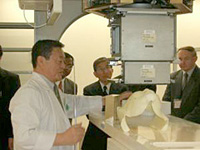 |
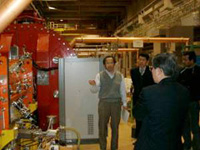 |
| National Institute of Radiological Sciences (NIRS) |
HIMAC (Heavy Ion Medical Accelerator) |
|
